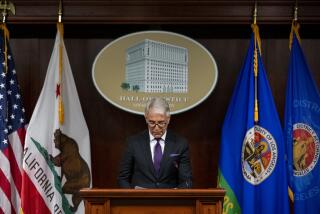Quattrone Lawyer Calls Evidence Misleading
- Share via
NEW YORK — In the first sharp exchange in the criminal trial of Frank Quattrone, a lawyer for the former Silicon Valley financier complained Wednesday to the judge that prosecutors were being allowed to show “misleading” evidence to the jury.
After the jurors had been dismissed for lunch, Quattrone’s lead defense attorney, John Keker, told U.S. District Judge Richard Owen that prosecutors should not have been permitted to outline in open court the details of a Securities and Exchange Commission subpoena sent to Quattrone’s former employer, Credit Suisse Group’s Credit Suisse First Boston.
The subpoena sought extensive information about how CSFB handed out shares of coveted initial public stock offerings to clients. The government was investigating whether the firm sought kickbacks from hedge funds in exchange for participating in hot IPOs. Quattrone is accused of trying to obstruct the SEC probe and a parallel grand jury investigation.
Keker argued that the details of the subpoena were misleading because the agency later narrowed the scope of its request.
“There is a lot of smoke going on here,” he told Owen in a raised tone of voice. “It was a very broad subpoena, but what difference does it make?”
Keker sought to introduce a document that he indicated would reinforce his argument, but Owen would not allow it into evidence at this point in the trial.
The government has accused Quattrone, 47, of trying to impede the probes by writing an e-mail encouraging employees to clean up their files. Quattrone claims he had no criminal intent in writing the message because he didn’t think that documents from his investment banking department were being sought by investigators.
On Wednesday, government lawyers tried to show that investigators asked CSFB for extensive details about its IPO allocations and that their requests clearly included information from Quattrone. Keker countered by arguing that Quattrone didn’t know what information was being sought.
Keker asked officials from the SEC and the NASD, another Wall Street regulator, whether they directly queried Quattrone for information. The officials said they dealt with CSFB lawyers in New York, who they expected would contact the appropriate employees.
A document introduced Wednesday revealed that the NASD believed up to 20 hedge funds may have paid kickbacks to CSFB to obtain IPO shares. Investigators suspected that in return for IPO shares, recipients paid inflated commissions on trades involving other stocks.
In testimony, Roger Sherman, who runs the NASD’s enforcement division, didn’t say whether the agency investigated the funds further or whether it or any other agency took action against them.
Bloomberg News was used in compiling this report.
More to Read
Inside the business of entertainment
The Wide Shot brings you news, analysis and insights on everything from streaming wars to production — and what it all means for the future.
You may occasionally receive promotional content from the Los Angeles Times.










